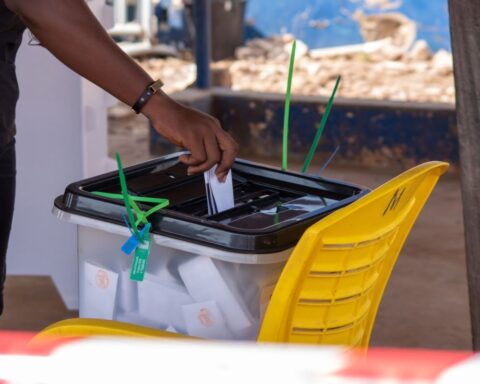On July 2, 2025, Dennis “Miracles” Aboagye, an aide to former Ghanaian Vice President Mahamudu Bawumia, posted a scathing critique of the CEO of Global Info Analytics (GIA) on his Facebook Page.
One reason Mr. Aboagye had written on Facebook was because the firm’s CEO, Mussa Dankwah, whose company conducts election polling in Ghana, had attributed the loss of National Patriotic Party (NPP) membership to the former Vice President while on a news program.
“I won’t stop calling out your skewed polls“, Mr Aboagye said in his post.
“I am part of some 6 million others who are quite convinced you are biased towards the NDC. The only pollster in the world that’s currently fixated on the opposition party.”
This wouldn’t be the first time Mr. Aboagye had criticised Mr. Dankwah and his credibility as a pollster.
In the lead up to the 2024 general elections, he criticised polling data from Global Info Analytics, which predicted that then former President John Mahama would secure 52.2% of the vote.
“Is it not strange that in all the polls we have had for the 2024 elections, it is only Mussa Dankwah’s polls that predict John Mahama and, ridiculously so, give some outrageous percentages to the former president?” Mr. Aboagye asked in an interview.
“If I look at the figures Mussa Dankwah has put out, then basically, what he is saying is that the former president is winning this election by about 2 million votes. Where is he going to get those 2 million votes from?“
In December 2024, John Mahama won the election with 56.42% of the vote. His opponent, Dr. Bawumia, who obtained 41.75%, conceded the election in less than 48 hours after ballots were cast.
From Accounting To Election Pollster
A former investment and risk manager for Transport for London in the UK, Mussa Dankwah has been the face of Global Info Analytics after establishing the firm in Ghana in 2015.
The company, which conducts economic and market research, as well as risk forecasting, has gotten a boost in media coverage due to the release of its accurate political polling data over the years.
So what made a chartered accountant with over 20 years of experience decide to jump into the political arena as a pollster?
“I decided to veer into polling out of passion,” he said in an online interview with The Labari Journal.
“I had a view that the polls that were being done in this country were not really being done well and professionally. They were more or less driven by partisan interests. So we felt we had to fill the void.”
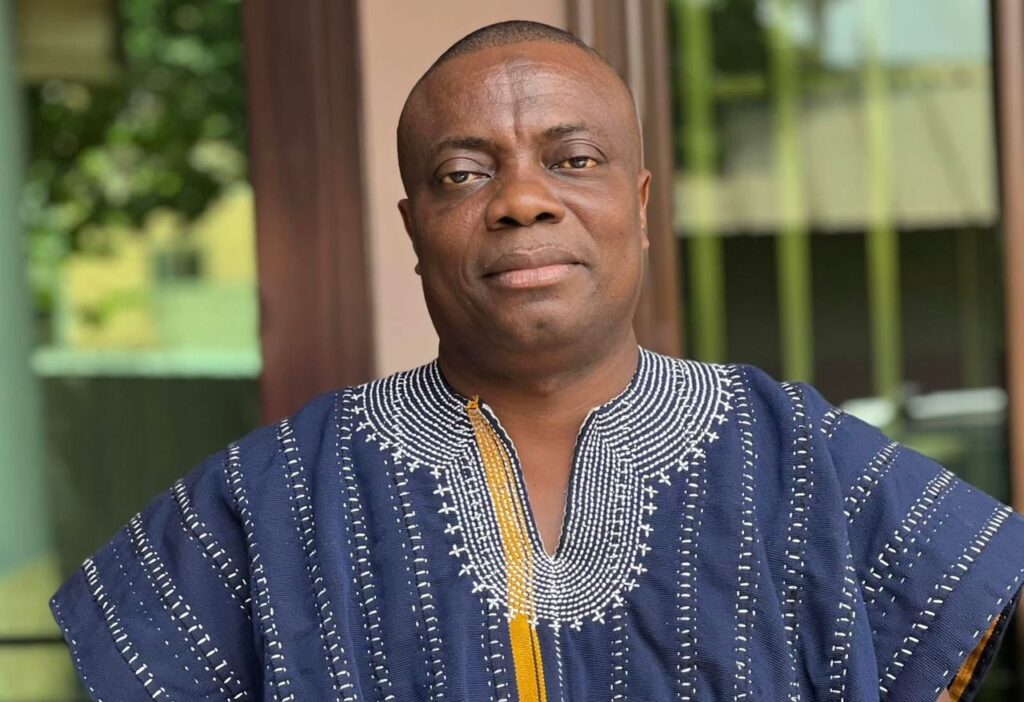
The firm first made headlines in the lead-up to the 2020 general elections when it predicted that Nana Akufo Addo would win the majority of votes. (The firm predicted he would garner 50.4% of the vote. He would go on to win with 51.3%)
The firm would later predict the 2024 elections, proclaiming that then former President John Mahama would emerge as the winner with 54.30% of the vote.
President Mahama went on to with with 56.42%.
Mr. Dankwah describes Global Info Analytics’ polling data service as the company’s corporate social responsibility (CSR) initiative.
“The success of our business model is tied directly to the success of our polls,” he noted, emphasizing the importance of accuracy in building the company’s reputation.
A Methodical Approach to Polling
So how does Mr Dankwah’s firm gather its data to make its accurate predictions?
According to the CEO, they employ a combination of face-to-face interviews, telephone polls, and, to a lesser extent, online surveys to capture a comprehensive picture of public sentiment.
With a network of over 350 field officers across Ghana, Global Info Analytics conducts face-to-face interviews in constituencies selected by a custom-built simulator, ensuring a randomized and unbiased sample.
“We tell the simulator to select X percentage of constituencies in the country and then give the system a sample we have targeted,” Mr Dankwah explained. This approach minimizes human interference and enhances the reliability of the data.
The company has also built an extensive database of nearly 100,000 voter phone numbers, collected with permission during field interviews, allowing for longitudinal telephone polls that track the same respondents over time.
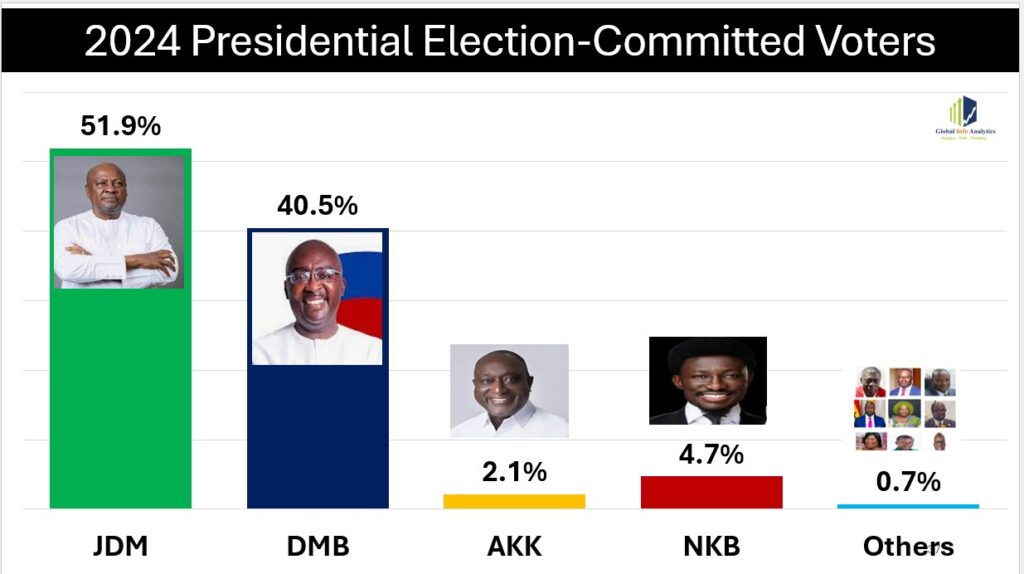
According to Mr. Dankwah, this method proved particularly effective during the 2020 Ghanaian elections, where Global Info Analytics’ predictions were notably accurate.
For harder-to-reach demographics, such as the upper class, the firm conducts targeted sampling at locations like shopping malls and online surveys.
Mr. Dankwah said his team also leverages technology to streamline data collection, using tablets to gather responses in real time. A quality control team monitors the data for inconsistencies, enabling rapid intervention if issues arise.
“We use random probability sampling,” Mr Dankwah said, noting that demographic questions are deliberately asked after substantive ones to avoid influencing respondents’ answers. “When somebody reveals their demography, it tends to influence the kind of choices they make in political elections.”
Accusations of Bias and Allegiance to Political Actors
Political polling in Ghana is not without its challenges.
Critics often question the motives behind independent polls, assuming they are funded by political actors seeking to sway public opinion.
The Managing Editor of the Daily Dispatch newspaper, Ben Ephson, has faced some of these criticisms for his polling data in previous presidential elections.
Since 2000, Mr Ephson has published polls on presidential elections with a fair amount of accuracy.
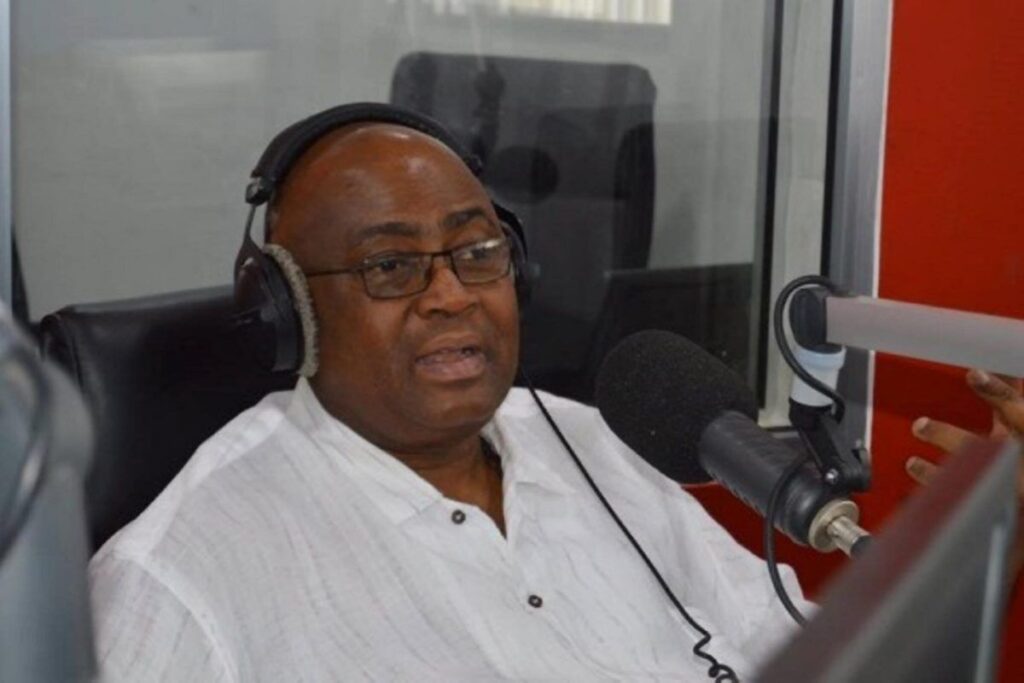
Out of these eight polls he has conducted, only two were incorrect: the 2016 election, where he predicted a win for the National Democratic Congress (NDC), and the 2024 election, where he forecasted a victory for the New Patriotic Party (NPP).
Despite past succeses, his recent poll numbers had led critics to question his credibility.
Mr. Dankwah has faced similar critiques with some personalities (including Dennis Aboagye of the NPP) accusing him of favoring the opposition party.
“They believe that the polls are designed to skew public opinion,” Mr Dankwah said of his critics.
There have been accusations and rumors that political parties have resorted to paying pollsters to release opinion polls in their favor to boost their credibility. Mr. Dankwah believes that some of those rumors were accurate.
“In the past, they’ve paid for these kinds of polls in order to skew public opinion. So if they’re not the ones paying, they think somebody else is.”
So far, Global Info Analytics’ polling data has been consistent and spot on.
In a recent by-election in the town of Akwatia in the Eastern Region, the firm predicted that the National Democratic Party (NDC) candidate, Bernard Baidoo, would emerge as the winner with 53% of the vote.
On September 2, 2025, the NDC candidate won with 54.1% of the total votes.
Has Election Polling in Ghana Gone Mainstream?
Alfred Appiah, a popular Ghanaian data scientist who regularly contributes to policy discussions in local news outlets, stated that although opinion polling in Ghana is still in its infancy, he appreciates the transparency of GlA in their work.
“Mussa Dankwa and his team at Global Info Analytics (GIA) are pioneers in consistent polling in Ghana with transparent methodology,” he replied online to an inquiry on GIA from The Journal.
“Before them, polls were often mentioned but it was difficult to access the underlying methodology. Methodology is critical for analysts to assess the legitimacy of any poll.“
Mr. Appiah believes that the success of GIA’s polling could set a precedent for more transparency from other firms who share future polling results in Ghana.
“The work GIA is doing sets the stage for more consistent and transparent polling firms to join the field and help grow the polling industry“.
A Shift Toward Data-Driven Discourse
Mr. Dankwah and Global Info Analytics influence has been growing, especially in consulting with the local government.
One of the firm’s most significant achievements came in 2021, when the Ghanaian government used Global Info Analytics’ polling data to inform the appointment of Metropolitan, Municipal, and District Chief Executives (MMDCEs).
By surveying shortlisted candidates to gauge their popularity, the firm’s data helped reduce the controversy typically associated with such appointments. “It was informed and driven by data,” Mr. Dankwah said.
The company has also conducted opinion polls on other every day issues affecting the citizenry.
Earlier this year, it released opinion polls on a recent decision by the government to add a fuel levy. (Which majority of Ghanaians supported)
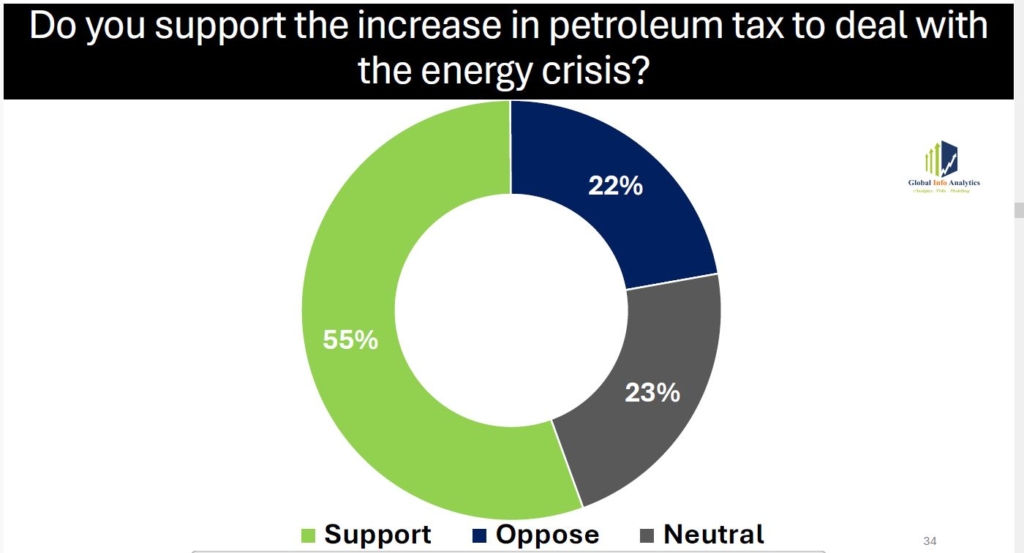
In April 2025, it published opinion data which showed that Ghanaians were generally in favor of the performance of President Mahama’s administration.
As the company grows its profile, Mr. Dankwah sees Global Analytics’ reach extending outside the borders of Ghana.
“I see myself venturing into other African countries,” he said. We’ve tried to incorporate a branch in Gabon, we are looking to open another branch in East Africa.”
Mr Dankwah is hoping to leverage the company’s fortunes by becoming a household name when it comes to polling in Africa.
“Already, we have the likes of Fitch Solutions who have been using our data quite intensely when it comes to their political forecasting, which is quite good for us.”
Mr. Dankwah has also had conversations with companies, including Goldman Sachs and other notable companies, that reach out to inquire about the usage of Global Analytics’ data for their investor information reports.
At the moment, all eyes appear to be on Mr. Dankwah and his numbers in political forecasting. As far as competition, he welcomes more data-driven analysis into the political fray.
“We’ll be glad to see many companies who are independent doing polling. I believe that more independent organizations should be doing that.”



